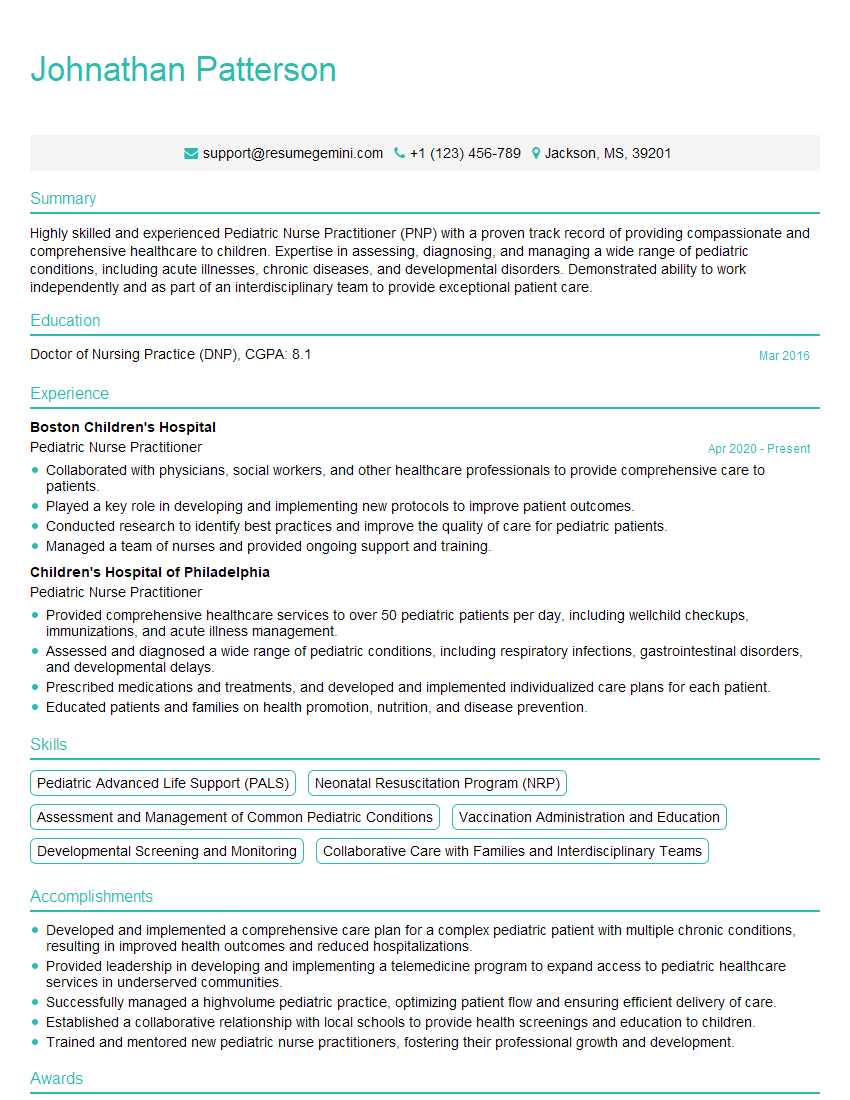Are you a seasoned Pediatric Nurse Practitioner seeking a new career path? Discover our professionally built Pediatric Nurse Practitioner Resume Template. This time-saving tool provides a solid foundation for your job search. Simply click “Edit Resume” to customize it with your unique experiences and achievements. Customize fonts and colors to match your personal style and increase your chances of landing your dream job. Explore more Resume Templates for additional options.

Johnathan Patterson
Pediatric Nurse Practitioner
Summary
Highly skilled and experienced Pediatric Nurse Practitioner (PNP) with a proven track record of providing compassionate and comprehensive healthcare to children. Expertise in assessing, diagnosing, and managing a wide range of pediatric conditions, including acute illnesses, chronic diseases, and developmental disorders. Demonstrated ability to work independently and as part of an interdisciplinary team to provide exceptional patient care.
Education
Doctor of Nursing Practice (DNP)
March 2016
Skills
- Pediatric Advanced Life Support (PALS)
- Neonatal Resuscitation Program (NRP)
- Assessment and Management of Common Pediatric Conditions
- Vaccination Administration and Education
- Developmental Screening and Monitoring
- Collaborative Care with Families and Interdisciplinary Teams
Work Experience
Pediatric Nurse Practitioner
- Collaborated with physicians, social workers, and other healthcare professionals to provide comprehensive care to patients.
- Played a key role in developing and implementing new protocols to improve patient outcomes.
- Conducted research to identify best practices and improve the quality of care for pediatric patients.
- Managed a team of nurses and provided ongoing support and training.
Pediatric Nurse Practitioner
- Provided comprehensive healthcare services to over 50 pediatric patients per day, including wellchild checkups, immunizations, and acute illness management.
- Assessed and diagnosed a wide range of pediatric conditions, including respiratory infections, gastrointestinal disorders, and developmental delays.
- Prescribed medications and treatments, and developed and implemented individualized care plans for each patient.
- Educated patients and families on health promotion, nutrition, and disease prevention.
Accomplishments
- Developed and implemented a comprehensive care plan for a complex pediatric patient with multiple chronic conditions, resulting in improved health outcomes and reduced hospitalizations.
- Provided leadership in developing and implementing a telemedicine program to expand access to pediatric healthcare services in underserved communities.
- Successfully managed a highvolume pediatric practice, optimizing patient flow and ensuring efficient delivery of care.
- Established a collaborative relationship with local schools to provide health screenings and education to children.
- Trained and mentored new pediatric nurse practitioners, fostering their professional growth and development.
Awards
- Recognized with the Daisy Award for providing exceptional patientcentered care to young patients.
- Honored with the Nurse of the Year Award by the local chapter of the National Association of Pediatric Nurse Practitioners for dedication to the profession.
- Received the Patient Choice Award for consistent high patient satisfaction scores and exceptional bedside manner.
- Recognized with the Excellence in Clinical Practice Award for innovative approaches to pediatric healthcare.
Certificates
- Pediatric Nurse Practitioner-Certified (PNP-C)
- National Board Certified Nurse Practitioner (CNBC)
- American Academy of Pediatrics (AAP) Member
- Association of Pediatric Nurse Practitioners (APNP)
Career Expert Tips:
- Select the ideal resume template to showcase your professional experience effectively.
- Master the art of resume writing to highlight your unique qualifications and achievements.
- Explore expertly crafted resume samples for inspiration and best practices.
- Build your best resume for free this new year with ResumeGemini. Enjoy exclusive discounts on ATS optimized resume templates.
How To Write Resume For Pediatric Nurse Practitioner
- Highlight your clinical experience and expertise in pediatric healthcare.
- Quantify your accomplishments to demonstrate the impact of your work.
- Showcase your commitment to continuing education and professional development.
- Proofread your resume carefully for any errors.
Essential Experience Highlights for a Strong Pediatric Nurse Practitioner Resume
- Provide comprehensive healthcare services to pediatric patients, including well-child checkups, immunizations, and acute illness management.
- Assess and diagnose a wide range of pediatric conditions, including respiratory infections, gastrointestinal disorders, and developmental delays.
- Prescribe medications and treatments, and develop and implement individualized care plans for each patient.
- Educate patients and families on health promotion, nutrition, and disease prevention.
- Collaborate with physicians, social workers, and other healthcare professionals to provide comprehensive care to patients.
- Manage a team of nurses and provide ongoing support and training.
Frequently Asked Questions (FAQ’s) For Pediatric Nurse Practitioner
What is the role of a Pediatric Nurse Practitioner?
A Pediatric Nurse Practitioner (PNP) is an advanced practice registered nurse (APRN) who provides primary and specialty care to infants, children, and adolescents.
What are the educational requirements to become a PNP?
To become a PNP, one must have a Master of Science in Nursing (MSN) or Doctor of Nursing Practice (DNP) degree from an accredited nursing program.
What are the certification requirements for a PNP?
PNPs must be certified by the Pediatric Nursing Certification Board (PNCB) or the American Nurses Credentialing Center (ANCC).
What are the job prospects for PNPs?
The job outlook for PNPs is expected to grow faster than average in the coming years due to the increasing demand for healthcare services for children.
What are the salary expectations for PNPs?
The salary for PNPs can vary depending on their experience, location, and employer. According to the U.S. Bureau of Labor Statistics, the median annual salary for nurse practitioners was $111,680 in May 2021.
What are the benefits of becoming a PNP?
PNPs have the opportunity to make a real difference in the lives of children and families. They enjoy a high level of job satisfaction and earning potential.